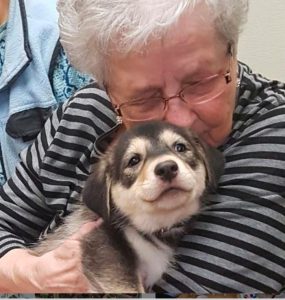
There are times in life when we all just need a friend. For seniors at Shaftesbury Park Retirement Residence in Manitoba, that friend is a first generation Labradoodle named Duchess.
At 4 years old, Duchess is a favourite with many residents. On a daily basis, she says hello to people in their rooms and common areas, participates in programming, and is always willing to for a walk.
While the evidence continues to mount that pet ownership is highly therapeutic for seniors, it’s usually only an option for those living independently and able to care for their pet’s needs. However, many people moving into a retirement residence do not want to part with their beloved dog or cat. That is why All Seniors Care retirement communities are pet friendly!
For those who do not have a pet of their own, they are encouraged to interact with residence pets, like Duchess, or attend organized pet therapy programs in the building. Read ahead to learn more about pet therapy and all of its wonderful health benefits.
What Is Pet Therapy?
Pet therapy, also referred to as animal assisted therapy, is a growing field that uses dogs or other animals to help people recover from or better cope with health challenges. For healthy individuals, it has a more general purpose, such as providing companionship and enjoyment. It’s a guided interaction between an individual and a trained animal that provides a safe, controlled space where people can pet and play with an animal. Usually, a handler will bring dogs or cats; and, sometimes guinea pigs, rabbits, or even horses.
The Health Benefits of Pet Therapy
1. It Lowers Your Stress Levels
One of the benefits of pet therapy is that it reduces stress. Spending time with a calm animal will ease the tension in your body and make you feel more relaxed. Researchers say that petting a cat or dog for ten minutes can alleviate stress and make you feel calmer.
2. It Improves Your Mood
Pets have a strong impact on mood. They can reduce anxiety, depression and other negative feelings. That’s because interaction animals causes your brain to release endorphins, as well as serotonin, prolactin and oxytocin. In other words, you feel good when you are with a pet!
Providing care for a pet also gives people a sense of purpose and meaning, thanks to the responsibility they feel.
3. It Reduces Feelings of Loneliness
Many seniors who are unresponsive to other treatment tend to be chattier and more open with pets around. This creates a bridge to still greater socialization, encouraging people to join in more activities and make friends more easily.
For those feeling the loneliness of dementia or stroke, an animals’ non-verbal communication and profound acceptance can be soothing, especially for those with difficulty using language. Some may even connect with memories of their own treasured pets.
4. It Gets You Moving
Pets can encourage seniors to get more exercise and spend time outdoors since dogs need to be walked often. Even activities like brushing and petting an animal improves mobility and dexterity.
Where Do the Animals Come From?
Because pet therapy has caught on so much in recent years, setting up a pet therapy program is fairly easy. Often, pet owners with well-trained animals (most often dogs) are willing to bring in their pooches through programs sponsored by the humane society, St. John Ambulance, or other non-profit organizations.
To put your mind at ease, therapy pets are always screened to ensure they meet three crucial criteria:
Temperament – must have a calm temperament, since a rowdy pup that loves to jump around and make mischief could disturb some residents.
“People” Dog – should be predisposed towards attention from anyone, without discriminating (between men and women for example).
Non-reactive – most dogs are accustomed to the stable environment of their home. Even if a dog is very calm in a home setting, they may be overwhelmed by strange sights and sounds and start barking and jumping on people. Therapy dogs must be calm and not easily distracted.
Pet Therapy at All Seniors Care
Philosophy Behind the Benefits (Connection)
At All Seniors Care, we place a lot of emphasis on the activities of daily living, including mobilizing, communicating, eating well and so on. As you get older, making sure you’re ticking these fundamental boxes can contribute to a happy, active lifestyle.
We’ve observed withdrawn residents brighten up immediately when a favourite pet owner stops by to drop off their pooch: there’s an immediate emotional connection and the physical affection shown by dogs is incredibly valuable.
Philosophy Behind the Benefits 2 (Nature)
All Seniors Care residences feature beautiful walking paths and green space – ideal for seniors who wish to walk their pets. Furthermore, animals themselves remind us of nature, of the wilderness and all the beauty and possibilities it contains. There’s a good reason that many of the most revered paintings are gorgeous landscapes, and that humans seek out hiking and camping whenever they can get out of the city. A connection with nature relieves stress and releases endorphins, making for a happier, healthier mind.
Take a look at our All Seniors Care Pet Therapy Gallery to see photos of some of our pet therapy visitors!
Peruse our blog to see more advice that will make senior living easier. It is filled with healthy eating tips, exercise ideas, tips for staying healthy and safe from COVID-19 and much more. Explore to see how you can make your life a little better.


